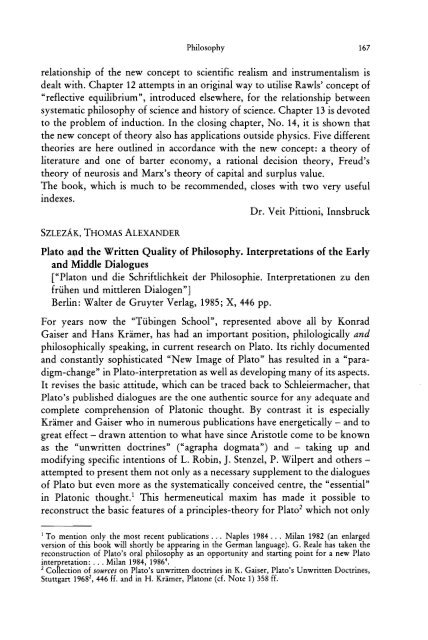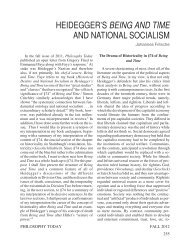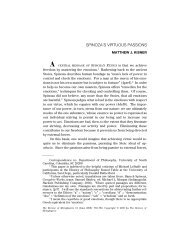Plato and the Written Quality of Philosophy. Interpretations of the ...
Plato and the Written Quality of Philosophy. Interpretations of the ...
Plato and the Written Quality of Philosophy. Interpretations of the ...
You also want an ePaper? Increase the reach of your titles
YUMPU automatically turns print PDFs into web optimized ePapers that Google loves.
<strong>Philosophy</strong> 167<br />
relationship <strong>of</strong> <strong>the</strong> new concept to scientific realism <strong>and</strong> instrumentalism is<br />
dealt with. Chapter 12 attempts in an original way to utilise Rawls' concept <strong>of</strong><br />
"reflective equilibrium", introduced elsewhere, for <strong>the</strong> relationship between<br />
systematic philosophy <strong>of</strong> science <strong>and</strong> history <strong>of</strong> science. Chapter 13 is devoted<br />
to <strong>the</strong> problem <strong>of</strong> induction. In <strong>the</strong> closing chapter, No. 14, it is shown that<br />
<strong>the</strong> new concept <strong>of</strong> <strong>the</strong>ory also has applications outside physics. Five different<br />
<strong>the</strong>ories are here outlined in accordance with <strong>the</strong> new concept: a <strong>the</strong>ory <strong>of</strong><br />
literature <strong>and</strong> one <strong>of</strong> barter economy, a rational decision <strong>the</strong>ory, Freud's<br />
<strong>the</strong>ory <strong>of</strong> neurosis <strong>and</strong> Marx's <strong>the</strong>ory <strong>of</strong> capital <strong>and</strong> surplus value.<br />
The book, which is much to be recommended, closes with two very useful<br />
indexes.<br />
Dr. Veit Pittioni, Innsbruck<br />
SZLEZAK, THOMAS ALEXANDER<br />
<strong>Plato</strong> a~d <strong>the</strong> <strong>Written</strong> <strong>Quality</strong> <strong>of</strong> <strong>Philosophy</strong>. <strong>Interpretations</strong> <strong>of</strong> <strong>the</strong> Early<br />
<strong>and</strong> Middle Dialogues<br />
["<strong>Plato</strong>n und die Schriftlichkeit der Philosophie. Interpretationen zu den<br />
fruhen und mittleren Dialogen"]<br />
Berlin: Walter de Gruyter Verlag, 1985; X, 446 pp.<br />
For years now <strong>the</strong> "Tubingen School", represented above all by Konrad<br />
Gaiser <strong>and</strong> Hans Kramer, has had an important position, philologically <strong>and</strong><br />
philosophically speaking, in current research on <strong>Plato</strong>. Its richly documented<br />
<strong>and</strong> constantly sophisticated "New Image <strong>of</strong> <strong>Plato</strong>" has resulted in a "paradigm-change"<br />
in <strong>Plato</strong>-interpretation as well as developing many <strong>of</strong> its aspects.<br />
It revises <strong>the</strong> basic attitude, which can be traced back to Schleiermacher, that<br />
<strong>Plato</strong>'s published dialogues are <strong>the</strong> one au<strong>the</strong>ntic source for any adequate <strong>and</strong><br />
complete comprehension <strong>of</strong> <strong>Plato</strong>nic thought. By contrast it is especially<br />
Kramer <strong>and</strong> Gaiser who in numerous publications have energetically - <strong>and</strong> to<br />
great effect - drawn attention to what have since Aristotle come to be known<br />
as <strong>the</strong> "unwritten doctrines" ("agrapha dogmata") <strong>and</strong> - taking up <strong>and</strong><br />
modifying specific intentions <strong>of</strong> L. Robin, J. Stenzel, P. Wilpert <strong>and</strong> o<strong>the</strong>rs -<br />
attempted to present <strong>the</strong>m not only as a necessary supplement to <strong>the</strong> dialogues<br />
<strong>of</strong> <strong>Plato</strong> but even more as <strong>the</strong> systematically conceived centre, <strong>the</strong> "essential"<br />
in <strong>Plato</strong>nic thought.! This hermeneutical maxim has made it possible to<br />
reconstruct <strong>the</strong> basic features <strong>of</strong> a principles-<strong>the</strong>ory for <strong>Plato</strong> 2 which not only<br />
1 To mention only <strong>the</strong> most recent publications ... Naples 1984 ... Milan 1982 (an enlarged<br />
version <strong>of</strong> this book will shortly be appearing in <strong>the</strong> German language). G. Reale has taken <strong>the</strong><br />
reconstruction <strong>of</strong> <strong>Plato</strong>'s oral philosophy as an opportunity <strong>and</strong> starting point for a new <strong>Plato</strong><br />
interpretation: ... Milan 1984, 1986'.<br />
2 Collection <strong>of</strong> sources on <strong>Plato</strong>'s unwritten doctrines in K. Gaiser, <strong>Plato</strong>'s Unwritten Doctrines,<br />
Stuttgart 1968 2 ,446 ff. <strong>and</strong> in H. Kramer, <strong>Plato</strong>ne (d. Note 1) 358 ff.
168 <strong>Philosophy</strong><br />
constitutes <strong>the</strong> systematic fundament <strong>of</strong> <strong>the</strong> <strong>Plato</strong>nic dialogues but has become<br />
decisive for <strong>the</strong> basic conceptual <strong>and</strong> ontological structure <strong>of</strong> Neoplatonism<br />
<strong>and</strong> <strong>the</strong> philosophical systems which are connected with it materially <strong>and</strong><br />
historically speaking. This has not meant suppressing <strong>the</strong> dialogues or demoting<br />
<strong>the</strong>m to a "quarry" for <strong>the</strong> real-au<strong>the</strong>ntic: thanks to <strong>the</strong> principles-<strong>the</strong>ory<br />
<strong>and</strong> <strong>the</strong> <strong>the</strong>orems connected with it, much which used to have to appear as a<br />
break, as something enigmatic or giving rise to discrepancy or aporia, can now<br />
be understood in a more thorough way, a way which is more intense in terms<br />
<strong>of</strong> argumentation <strong>and</strong> even more complex in terms <strong>of</strong> substance, without that<br />
which <strong>Plato</strong> considered it impossible to say being laid bare in a dull abstraction.<br />
Thomas Alex<strong>and</strong>er Szlezik's book testifies to <strong>the</strong> degree to which taking<br />
seriously those doctrines <strong>of</strong> <strong>Plato</strong> which he himself was very "serious" about<br />
can be productive - precisely for a new interpretation <strong>of</strong> <strong>the</strong> dialogues<br />
<strong>the</strong>mselves. Amidst <strong>the</strong> virtually endless deluge <strong>of</strong> publications on <strong>Plato</strong>, a<br />
deluge which continues to swell to worrying proportions because <strong>of</strong> superfluous<br />
repetition, Szlezik's book st<strong>and</strong>s out very strikingly through <strong>the</strong> originality<br />
<strong>of</strong> its perspective, through <strong>the</strong> consistent realization <strong>of</strong> a basic idea which is<br />
highly instructive for <strong>the</strong> subject-matter at h<strong>and</strong> <strong>and</strong> through <strong>the</strong> thoroughness<br />
<strong>of</strong> its examination <strong>of</strong> competing <strong>and</strong> above all <strong>of</strong> opposing ideas which are -<br />
with greater or lesser reason - sceptical as regards <strong>the</strong> new <strong>Plato</strong> paradigm.<br />
<strong>Plato</strong>'s criticism - discussed in great detail by Szlezik - <strong>of</strong> <strong>the</strong> written<br />
communicating <strong>of</strong> philosophical thought (Phaidros 274b - 278e) becomes for<br />
him <strong>the</strong> key to <strong>the</strong> question as to <strong>the</strong> relationship <strong>of</strong> <strong>the</strong> oral pursuit <strong>of</strong><br />
philosophy <strong>and</strong> <strong>the</strong> written presentation (mimesis) <strong>of</strong> <strong>the</strong> living dialogue. In<br />
accordance with <strong>Plato</strong>nic writing-critique it is very much intrinsic to <strong>the</strong><br />
philosophical logos that it can defend itself, can help itself, that it is in a<br />
position productively to continue <strong>the</strong> questions which are placed in it <strong>and</strong><br />
which it is asked <strong>and</strong> in so doing refer to "timiotera", to "all that is more<br />
valuable", i. e. more extensively justified; not only must <strong>the</strong>se "timiotera" not<br />
be explicitly stated, but <strong>the</strong>y ought consciously to be held back, to be omitted<br />
<strong>and</strong> reserved for conversations with real friends who are capable <strong>of</strong> underst<strong>and</strong>ing<br />
a higher problem-level. Books, thus also dialogues published in<br />
written form, are not inherently able to do this: <strong>the</strong>y "are constantly saying <strong>the</strong><br />
same thing" <strong>and</strong> remind one at times <strong>of</strong> "<strong>the</strong> prolonged din <strong>of</strong> cymbals"<br />
(Pol. 329 a 5). It follows from this that "he who has knowledge", he who has<br />
knowledge <strong>of</strong> "timiotera" <strong>and</strong> has a sensible attitude towards <strong>the</strong>m, "<strong>Plato</strong>"<br />
<strong>the</strong> author <strong>of</strong> philosophical book-dialogues, quite consciously <strong>and</strong> consistently<br />
omits <strong>the</strong> "problems which are especially to do with principle".<br />
Taking this <strong>Plato</strong>nic critique <strong>of</strong> writing as his guiding <strong>the</strong>me Szlezik now goes<br />
on to pursue <strong>the</strong> question addressed to <strong>the</strong> individual dialogues, namely<br />
whe<strong>the</strong>r <strong>and</strong> in what respect <strong>the</strong>y are capable <strong>of</strong> <strong>and</strong> in need <strong>of</strong> supplementa-
<strong>Philosophy</strong> 169<br />
tion <strong>and</strong> deepening. The superiority on principle <strong>of</strong> <strong>the</strong> "living" oral logos over<br />
against <strong>the</strong> written utterance consists in <strong>the</strong> above-mentioned capacity to help,<br />
in its "boe<strong>the</strong>ia structure". Seen from this perspective, it becomes underst<strong>and</strong>able<br />
that Szlezik, guided by a very acute sensitivity for <strong>the</strong> <strong>Plato</strong>nic language,<br />
tracks down precisely those places in <strong>the</strong> dialogue-process which break <strong>of</strong>f<br />
specific thought-sequences, omit <strong>the</strong> discu.ssion <strong>of</strong> a pertinent question in a<br />
calculated manner <strong>and</strong> - not least with a view to <strong>the</strong> capacity <strong>of</strong> <strong>the</strong> dialoguepartners<br />
- refer to philosophemes which could be said (as "timiotera"), but<br />
which should not be said in <strong>the</strong> present context. The testing <strong>of</strong> <strong>the</strong> "boe<strong>the</strong>ia<br />
model" necessarily entails that <strong>the</strong> interpretation should not be oriented -<br />
"anti-esoterically" - only to <strong>the</strong> explicit results <strong>of</strong> <strong>the</strong> discussion, but ra<strong>the</strong>r<br />
that it should cast light on <strong>the</strong> complex development <strong>of</strong> ideas in <strong>the</strong> dialogue<br />
process, <strong>and</strong> this in scrupulous detail. Against <strong>the</strong> opinion <strong>of</strong> many a critic,<br />
Szlezik's procedure does precisely demonstrate that a careful heeding <strong>of</strong> <strong>the</strong><br />
reference-structure <strong>of</strong> <strong>the</strong> dialogues contributes to a more exact deciphering <strong>of</strong><br />
<strong>the</strong>ir dramaturgical course; on <strong>the</strong> o<strong>the</strong>r h<strong>and</strong>, <strong>the</strong> consequence <strong>of</strong> such a<br />
comprehension-maxim is precisely that "The dialogues <strong>the</strong>mselves force us to<br />
take <strong>the</strong> indirect <strong>Plato</strong> tradition seriously" (330) - thus dialogues <strong>and</strong><br />
unwritten doctrines form with each o<strong>the</strong>r a hermeneutical circle which is<br />
precisely not a vicious circle, but ra<strong>the</strong>r extremely instructive <strong>and</strong> necessary in<br />
concrete terms. The present reviewer believes it will be justifiable to assert that<br />
Szlezik's consistent application <strong>of</strong> <strong>the</strong> perspective which guides him to socalled<br />
omitting <strong>and</strong> referring places has resulted in <strong>the</strong> discovery <strong>of</strong> new aspects<br />
<strong>of</strong> <strong>the</strong> dialogues from "Euthydemus" to "Republic", aspects which would also<br />
<strong>of</strong> necessity be evident to an "anti-esotericist", while on <strong>the</strong> o<strong>the</strong>r h<strong>and</strong> also<br />
confronting him with arguments which he will have difficulties in evading. The<br />
sheer richness <strong>of</strong> <strong>the</strong> insights into <strong>the</strong> structure <strong>of</strong> <strong>the</strong> course <strong>of</strong> <strong>the</strong> conversation<br />
<strong>of</strong> <strong>the</strong> individual dialogues <strong>and</strong> into those characterizations <strong>of</strong> <strong>the</strong> dialogue<br />
partners - not least <strong>of</strong> Socrates - which are crucial for <strong>the</strong> actual thought, can<br />
hardly be rendered sufficiently plausible given <strong>the</strong> brief scope <strong>of</strong> a review<br />
aiming to provide provisional information. One should not, however, omit to<br />
point out that <strong>the</strong> superb knowledge <strong>of</strong> <strong>the</strong> research-situation that becomes<br />
apparent in <strong>the</strong> notes <strong>and</strong> <strong>the</strong> appendices <strong>and</strong> <strong>the</strong> patient <strong>and</strong> fair analysis <strong>of</strong><br />
contrary positions only enhance <strong>the</strong> persuasiveness <strong>of</strong> Szlezik's basic intentions<br />
<strong>and</strong> <strong>the</strong> results <strong>of</strong> his interpretation. The section on <strong>the</strong> modern <strong>the</strong>ory <strong>of</strong><br />
<strong>the</strong> dialogue form, modestly called "Appendix I", should be read as <strong>the</strong> second<br />
centrepiece <strong>of</strong> <strong>the</strong> book. Here Szlezik reconstructs <strong>the</strong> essential elements <strong>of</strong><br />
<strong>the</strong> dialogue <strong>the</strong>ory previously hinted at, a <strong>the</strong>ory which in its modern<br />
interpretation <strong>of</strong> <strong>Plato</strong> goes back to Schleiermacher. In ten <strong>the</strong>ses criticizing<br />
this <strong>the</strong>ory Szlezik develops arguments <strong>of</strong> penetrating insight against <strong>the</strong>, at<br />
bottom, naive mystification <strong>of</strong> <strong>the</strong> written dialogue as a "superbook" which is
170 <strong>Philosophy</strong><br />
made out to be an "active" text which despite its indirect form <strong>of</strong> communication<br />
must still say everything that was important to <strong>Plato</strong>, so that in <strong>the</strong> style <strong>of</strong><br />
a "petitio principii" <strong>the</strong> historical existence <strong>of</strong> an oral philosophy <strong>of</strong> <strong>Plato</strong> can<br />
be denied. Szlezak points out <strong>the</strong> numerous aporias <strong>and</strong> discrepancies which<br />
result from such an absolutization <strong>of</strong> <strong>the</strong> dialogue in <strong>the</strong> form <strong>of</strong> a "dialoguebook"<br />
<strong>and</strong> thus consciously or unconsciously cover over <strong>Plato</strong>'s radical<br />
scepticism as regards all that is written. Szlezak is right in opposing <strong>the</strong> urge,<br />
bordering on <strong>the</strong> absurd, to underst<strong>and</strong> <strong>Plato</strong>'s published texts as being totally<br />
ironical: <strong>the</strong> modern ironist, proceeding in a high-h<strong>and</strong>ed manner, consistently<br />
excludes from any underst<strong>and</strong>ing all readers who may possibly be<br />
capable <strong>of</strong> a more limited degree <strong>of</strong> irony: "The ironist is always right" (370).<br />
It was obviously not Szlezak's aim specifically to analyze in terms <strong>of</strong> its<br />
intrinsic philosophical value <strong>the</strong> material structure <strong>of</strong> <strong>the</strong> esoteric principles<br />
<strong>the</strong>ory, which critics see as being especially abstract; still, his work on <strong>the</strong><br />
dialogues - especially as regards this principles <strong>the</strong>ory - gives reason to hope<br />
that <strong>the</strong> "hostile camps" <strong>of</strong> "esotericists" <strong>and</strong> "anti-esotericists" will be able to<br />
attain if not a reconciliation, <strong>the</strong>n at least a new insight, in <strong>the</strong> light <strong>of</strong> which<br />
<strong>the</strong> "unwritten" in <strong>Plato</strong>'s thought may not be suppressed or reduced to<br />
supposedly insignificant, philosophically irrelevant trivialities without fur<strong>the</strong>r<br />
ado.<br />
Pr<strong>of</strong>essor Dr. Werner Beierwaltes, Miinchen<br />
TRAUGOTT, EDGAR<br />
Certainty in Uncertainty<br />
["Sicherheit im Ungewissen"]<br />
Zirndorf: Pauli-Balleis-Verlag, 1986; 195 pp.<br />
Edgar Traugott, from 1963 to 1977 editor-in-chief <strong>of</strong> <strong>the</strong> N umberger Zeitung,<br />
is not only an outst<strong>and</strong>ing diagnostician <strong>of</strong> <strong>the</strong> ills <strong>of</strong> his age <strong>and</strong> critic <strong>of</strong><br />
civilization, but a significant philosophical writer. This became clear at <strong>the</strong><br />
latest with <strong>the</strong> appearance <strong>of</strong> his book Die magnetische Weft ("The Magnetic<br />
World". (Heroldsberg: Glock & Lutz 1983), whose call for a 'revival <strong>of</strong><br />
thinking' is continued <strong>and</strong> intensified in <strong>the</strong> present volume. Traugott's is an<br />
independent mind <strong>and</strong> a brooding one; he is a loner, meditating outside all <strong>the</strong>.<br />
schools, ideologies <strong>and</strong> "isms". But this is not to say that he does not attach<br />
himself - in a productive sense - to certain traditions, or that he does not revive<br />
<strong>and</strong> fructify much that has already been thought. He can be fitted in nowhere.<br />
Nei<strong>the</strong>r in what he says nor in <strong>the</strong> way he says it can he be subsumed under<br />
traditional labels. He does not proceed systematically, draws up no plans for
















